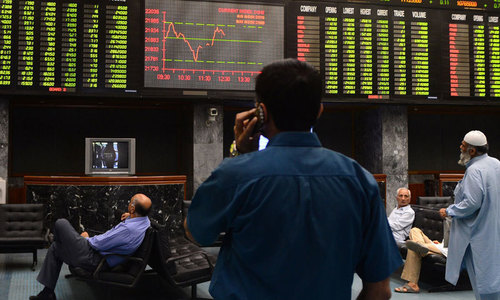People are still engaged in a heated debate over the Central Bank’s intervention to depreciate the rupee by around nine per cent in fewer than four months. Was it necessary and why so much so fast?
It has long been known that former Finance Minister Ishaq Dar dismissed every suggestion of adjusting the currency to its fair value.
Also read: Is 2018 a good year to invest in Equity Mutual Funds?
Most economists insist that the steep downward revision of the rupee to a dollar had to be done to ease pressure on the external account and arrest the drawdown of reserves. To many, the economy was and perhaps still is, in a state of emergency.
In fact, the recent devaluation has stirred a rally at the stock market, asserts a trader
Victor Hugo once said: “Emergencies have always been necessary to progress. It was darkness which produced the lamp. It was fog that produced the compass. It was hunger that drove us to exploration. And it took a depression to teach us the real value of a job.”
But not every individual is so optimistic, many worry of what comes next?
On Thursday, there was a consistency in the belief that the policy rate would be revised the next day, when the State Bank of Pakistan (SBP) unveils its monetary policy statement for the next two months.
Most economists and strategists converge on an increase by 25bps to 6.25pc. Raising the interest rate is a tool to combat inflation which is about to fire up due to a host of reasons: rupee devaluation, surging imports and hike in international oil prices. But surprisingly, the SBP on Friday kept its policy rate unchanged at 6pc for the next two months, citing prospects for strong growth and inflation “within comfortable bounds” for the next year.
Majyd Aziz, president Employers Federation of Pakistan conceded that a steep decline in the Pakistani currency had created some uneasiness in the minds of businessmen and industrialists.
“We are essentially an import-based country and even the largest exported item, textile, constitutes 30-35pc imported raw material”, he said, but admitted that within the sector, except for spinning, exporters of many other related products such as hosiery, towel, cloth and readymade garment would benefit.
Import substitution industrialisation is still a distant dream and until it happens the industries will have to bear a higher cost of doing business.
Another CEO of a cement company lamented that highly leveraged companies, such as his, which have taken loans to finance expansion and working capital are likely to take a hit on their bottom-line due to a surge in finance costs. There could be cost over-runs where machinery is yet to be imported for already announced expansions.
But some economists say that the government had limited options. “It’s a vicious circle in which the economy is trapped”, said one. With the month of Ramazan around the corner, followed by the lavish spending on Eid festivities, galloping inflation will scarcely be a surprise.
Many economists do not subscribe to the old school of thought that considered the stock market as a barometer of economy.
“Nothing could be further from truth”, said one. He argued that the rise of the Pakistan stock market in 2016, that distributed the mouth-watering 44pc return to investors in equities, had little to do with the health of the country’s economy.
He recalled that an unfriendly budget that burdened investors with heavier taxation, the Finance Ministry’s unfathomable attitude of dismissal of all budgetary proposals put forth by the Exchange and finally the mid-May 2017 debacle of heavy outflows in place of the expected dollar inflows from foreign funds (on the Pakistan market’s relocation to the MSCI Emerging Market status), left investors gasping for breath.
All through 2017 political uncertainty took its toll on the market. A senior stock broker who has been in the business for four decades asserted that the rise in interest rates and surge in inflation had little impact on the capital markets in the long haul.
“Even the steep devaluation of the rupee will soon be a thing of the past”, he was willing to wager. To prove his point, he alluded to the average return on investment in stocks over the past 10 years, which according to calculations by several brokerage houses works out to a handsome 25pc.
“Where do you get this kind of return”, asks a stock trader. He claimed that the economic woes in the last decade had neither dented stock prices nor the profitability of the underlying companies. In fact, he asserted that the recent rupee devaluation had stirred a rally at the stock market with the benchmark KSE-100 Index recording a weekly gain of 1,667 points or 3.8pc.
Numerous sectors would actually benefit from the rupee devaluation that leads to a hike in interest rates. “Every 1 percentage point increase in interest rates results in a 6pc rise in banks’ earnings”, calculated one analyst.
Oil and Gas Exploration and Independent Power Producers (IPPs) can see their earnings grow due to dollar denominated revenues. Conversely, the auto assemblers and cement producers who could have taken a hit on their bottom lines are already passing over increased costs to consumers.
“Spooked investors do not swoop in on shares”, said a stock broker. He was optimistic that the increase in interest rate and the devaluation of the rupee had brought the Pakistan stock market back on to the radar of foreign fund managers.
“The recent net buying by foreigners, after a prolonged period of outflows is evidence that the foreigner’s long wait for the adjustment of Pakistani currency is over and they have started to enter the market, enticed by low valuations and higher returns compared with regional markets”.
Published in Dawn, The Business and Finance Weekly, April 2nd, 2018













































